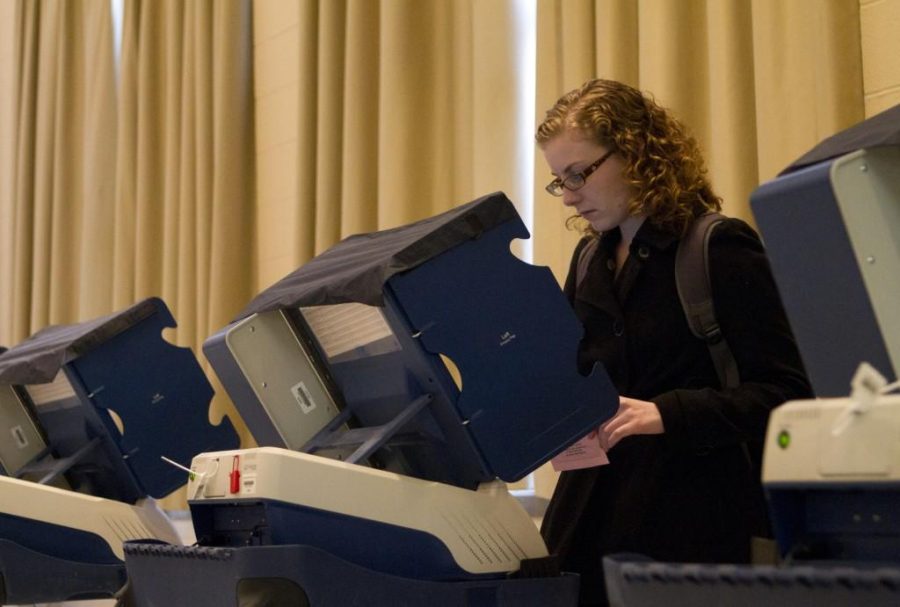Evanston residents weigh in on the Fair Tax Amendment
Daily file photo by Meghan White
Illinois residents will vote on the Fair Tax referendum this November, which would change the state’s tax system from the current flat tax system to a graduated income tax.
October 1, 2020
This November, Illinois residents will decide if they want the state to change its tax system from the current flat tax system to a graduated income tax. The Illinois Fair Tax referendum would introduce a progressive income tax and would require a supermajority to pass.
Supporters of the amendment say installing a graduated income tax will create a more equitable tax system while providing the state with needed revenue. The Illinois Constitution currently mandates the same income tax rate for everyone, which now sits at 4.95 percent. According to Senate Bill 687, the Fair Tax would gradually increase rates for those who make $250,000 and up.
Kathy Tate-Bradish, a board member of the League of Women Voters of Evanston, said the proposed system, which would make wealthier people pay more in taxes, is truly fair. Tate-Bradish has been doing voter outreach with the organization to advocate for the amendment.
“It’s fairer because that isn’t coming out of people’s necessary spending,” Tate-Bradish said. “If you’re taxing somebody who earns $22,000 a year at a 14 percent rate in the state, that comes out of real spending decisions: food, or diapers? New shoes or Salvation Army again?”
Tate-Bradish said a graduated income tax is the only current solution to create more revenue for the state of Illinois without increasing the burden on people with lower incomes. With a flat tax, those who make less money have to pay a greater proportion of their income. She said it makes sense that people with more money should pay taxes at a higher rate, and in doing so provide the state with a considerable amount of revenue.
“The revenue has to come from someplace, and we can’t encourage everybody to smoke marijuana so that we can tax it,” she said, referencing the Illinois Cannabis Regulation and Tax Act that went into effect this year.
Annette Wallace, an Evanston resident, will vote in favor of the initiative because the taxes in Illinois are unfair, she said. Wallace has paid taxes in other states, but in Illinois, she has gotten the least money back and has faced the greatest tax burden.
Wallace said she would expect people who make $250,000 and up to be upset, but still hopes Evanston residents vote in favor of the amendment.
“Most people don’t make $250,000 a year in Evanston,” Wallace said. “There are a number of people who make $250,000 a year. I would think that they might be upset about it. But the liberals wouldn’t be, I hope. I’m always hoping.”
According to the United States Census Bureau, the median household income in Evanston in 2018 was $77,848, well below the $250,000 tax bracket.
Tate-Bradish said she expects the ballot initiative to do well among Evanston voters, partly because Evanston property taxes are known to be high. If the government installs a graduated income rate, the city will rely less on property taxes to fund education and other social services, and Evanston residents may hope to eventually have their property taxes lowered, Tate-Bradish said.
While some residents support the tax change, Blair Garber, Evanston Township GOP committeeman, said installing a graduated income tax will drive wealthy people and businesses out of the state and hurt the middle class. He said the flat tax has been the only financial decision the state has gotten right, and changing it would be a mistake.
The problem, Garber said, is the state’s Democratic establishment sees Illinois’s fiscal troubles as a revenue issue rather than a spending issue. Garber said instead of changing taxes, the state should pursue a constitutional amendment that would reduce public employment benefits.
“This is going to be another in a very large nail in Illinois’s fiscal coffin,” Garber said. He later added, “When it comes to taxes, there’s only one pocket that the money’s coming from, and that’s ours.”
While Garber doesn’t support the amendment, he said Democratic House Speaker Michael Madigan (D-Chicago) doesn’t put forward bills that won’t pass, so he would be astonished if the Fair Tax referendum failed. Garber said he is planning on leaving Illinois at some point in the future in favor of a red state.
Email: delaneynelson2023@u.northwestern.edu
Twitter: @delaneygnelson
Related stories:
— Pritzker proposes not one, but two budgets, relying on the Illinois Fair Tax measure
— State revenue shortfalls to impact human services and education; Pritzker calls on Congress for aid



